On My Last Leg
As seems to happen every time for me, my final ride in Spain back to the ferry is a soaker.
My book ‘North to Norway’ is out in paperback and e-book. It's a story as much about the joy of travel as about motorcycling.
My readers are international. David (‘Tiger’) Coward is a well-known adventure motorcyclist, author and book reviewer from Canada. He has one of the largest collections of the genre in the world. He posted on FaceBook.
“North to Norway is a well-written and engaging travel journal. His vivid storytelling will leave you with a great sense of what it would have been like to travel alongside him. If you’re an adventure motorcycle enthusiast–or simply enjoy travel writing–this book is well worth the read.”
Recent excerpts might have given you a flavour of my writing and the adventures I recount in the book. I hope that you’ll want to buy the full version, available now on Amazon and in selected branches of Waterstones.
In last week’s extract Tour de France I was about to tackle the passes and climbs of the TdF. It turned out to be a fabulous day’s riding in the high mountains of the Pyrenees. I’d ridden onwards to St Jean de Luz, in the south of France, where the weather turned bad, just in time for the long ride to the ferry to England.
There’s always a moment of trepidation in the morning, emerging from an overnight stop to check on the bike. Will it still be there? Sadly, bike theft is a common phenomenon these days. However, I was confident today that my bike would still be where I’d left it. The Honda was surrounded by a large group of cops in a blue haze of cigarette smoke, a growing ring of fag-ends encircling it. These guys were the CRS, the tough riot control specialists, not to be messed with. It was like having my own personal security force looking after the bike. I never did find out why they were there. Saint-Jean-de-Luz seemed an unlikely place for a demo. Maybe it was a police awayday.
Today would be my last day’s riding before catching the Brittany ferry back to England. I was hoping for glorious weather to finish my southern leg of my journey on a high note. Unfortunately, the non-stop rain had other ideas. The car park was a miniature lake by now. I lingered over breakfast, hoping it might ease.
By half ten it was clear that the bad weather system was going nowhere. With a resigned sigh, I prepped myself for the final soggy leg. Gritting my teeth, I pulled onto the motorway, the roar of the engine barely audible over the drumming rain. Visibility was down to mere feet. The only guides were the flashing white lane markers, a blurry streak in my peripheral vision. The visor steamed up constantly, forcing me to squint through a watery haze, perpetually scanning for the dreaded red glow of brake lights. This wasn't riding, it was an exercise in blind faith and cold courage. Every mile felt like a minor victory, a hard-won step closer to the sanctuary of the ferry and, hopefully, drier times ahead.
At San Sebastián I simply had to come off the motorway and rest, such was the concentration and tension of the riding. I grabbed a coffee and pastel de nata in a small bakery, a pool of water gathering by my feet. The warmth of the room and the enticing scent of the cakes lulled me back to life.
A middle-aged man, kind eyes crinkled at the corners and sitting at a nearby table, smiled at me pitifully, and said in English with a hint of the north, ‘Welcome to the Basque Country.’
James was a British architect who had lived in this part of Spain for nearly twenty years.
‘I wouldn’t go back to England now. I love the Basque people, the food and wine but not the weather. That’s just like where I came from.’
‘Manchester?’
He laughed. ‘Right first time. It’s green here for a reason. We get more rain in San Sebastián than any other city in Spain.’
The Basque Country, home of the Guggenheim Museum and the Kursaal Congress Centre, has an outstanding reputation for modern architecture, which had drawn him there, despite the local language barrier.
‘Do you speak Euskara?’ I asked.
‘A little, but it’s totally different from Spanish. The Basques are so proud of their heritage,’ he said, pointing to the red, blue and white Basque flag on the wall, curiously like the Union Jack
‘Bit like how different Welsh is from English,’ I replied, thinking of my 100% Welsh wife who spends time every day reading in her native language. I could have gobbled down one of her Bara Brith cakes with my coffee right now.
‘Etxerako bidaia segurua. Safe journey back home,’ said James, as I picked up the bill to pay at the counter.
The black ribbon of road merged almost seamlessly into the dark and threatening sky for the last 140 kms to Zierbena on the west side of Bilbao, where the ship Salamanca was waiting to depart for Portsmouth. I hunkered down on the saddle, sheltering as best I could behind the windshield, peering through a slit at the bottom of my visor, like a mediaeval knight. Great gobbets of water clattered on the screen, splashing violently and seeping round the edges over me. Dampness eked its insidious way down my neck into the seams of my trousers and began to pool between my buttocks. I simply had to keep going and out of trouble for long enough. At a steady 70 kph or even slower it took a long while before signs for the docks started to appear. I rode through a large industrial estate, past oil tanks and over numerous speed humps. Mercifully, by the ferry there was no queue, and the orange-vested staff pointed me towards Border Control; I was passport-stamped out of the Schengen zone and rode rapidly up to where the vehicles were embarking.
It was with mixed emotions that I rode gingerly up its slippery checker plated ramp. This summer’s riding had been challenging and rewarding, and I felt a hint of loss at the conclusion of my journey to the southernmost tip of Europe.
But mixed with that feeling was a stronger emotion—anticipation for the next chapter of my adventure, the road trip with my riding mate Ralph to Nordkapp, the northernmost point of the continent. He’d not been able to join me for Iberia but was up for Scandinavia. While I’d been busy in Spain, he had been using his spare moments to modify and equip his BMW for northern climes. What stories would unfold on that journey? Who would we meet? What adventures and surprises would we have? Where would our journey lead us?
And, most personally, how would that next experience shape me, as this one had?
There were dozens of different ways I might have gone to Tarifa and then to Mallorca this summer. I will never know what might have happened on the roads I didn’t take. But I let serendipity shape most of my route rather than planning everything down to the last spreadsheet cell. I had enjoyed this new approach to travel, and felt a freedom I’d not experienced before—and even loved its sometimes chaotic spontaneity.
I’d always thought of myself as a lone rider and still clung to being self-reliant. I liked being totally at liberty to do as I pleased, beholden to nobody. I wondered how different that would be with Ralph. I would have to adapt.
Yet I also had felt the loneliness of crowds and appreciated more than ever the joys of sharing great moments, whether in nature or in culture or just with a simple laugh.
My Spanish had improved (a little) as I’d pushed myself to speak the language. There are still plenty of places where little English is spoken and the effort of making a connection with someone in their native tongue adds to the fun.
I learned much about the history of Spain, especially its bloody Civil War and began to appreciate why it’s so difficult a topic to confront for the Spanish.
The people I’d met had mostly been delightful and helpful, especially the police I’d come across. Even the French cops, not usually noted for being pussycats, were amicable.
A fortnight and more of good eating, drinking and less exercise than usual (especially with broken ribs) had added a few inches to my waistline, but I’d enjoyed an exceptional variety of local dishes, not all of which I’ve shared in the book for fear of being too foodie. The Hairy Bikers have that market sewn up.
The landscapes through which I’d travelled had been utterly varied and intriguing, shifting from region to region. Even the desert-like areas around Tabernas had a raw beauty.
There was a clear sense of poverty and rural deprivation in many places, especially in the north, which contrasted sharply with the wealth of the big cities and parts of the south. But throughout the country there was also a sense of unity and pride in place, even with the Catalonian independence issue. I wondered how Britain might feel by comparison, as the fleeting news from home seemed to emphasise deepening strife and division.
And then there were the roads and the bike.
Ewan McGregor said, ‘It was all about the motorbikes.’
I think we know that’s never the full story. For me, it wasn’t about the motorbike, my trusty Honda. The riding was never just a means to an end. It was the essence of the journey, a liberation from the ordinary. Each day, I looked forward to the open road, the freedom to choose my own path, to explore hidden corners and conquer challenging routes. The bike became my passport to adventure, a key to unlocking the secrets of Spain and the Pyrenees. Whether carving through mountain passes or weaving through city traffic, I was in my element, connected to the world in a way that only a rider can understand.
Yes, there was always the motorbike. And the motorbiking had been good.
© 2025 Stephen Oliver
If you’ve enjoyed this excerpt you can find the complete story in paperback and Kindle format on Amazon.

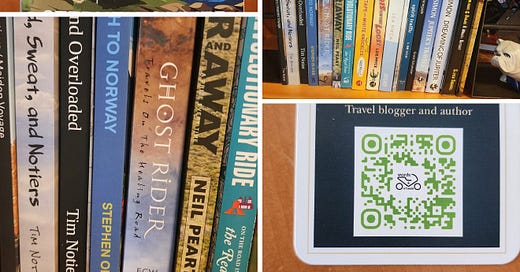


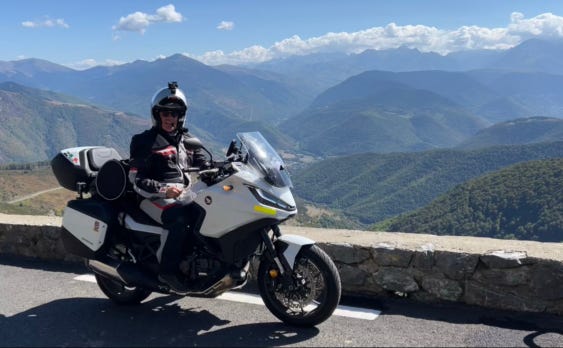
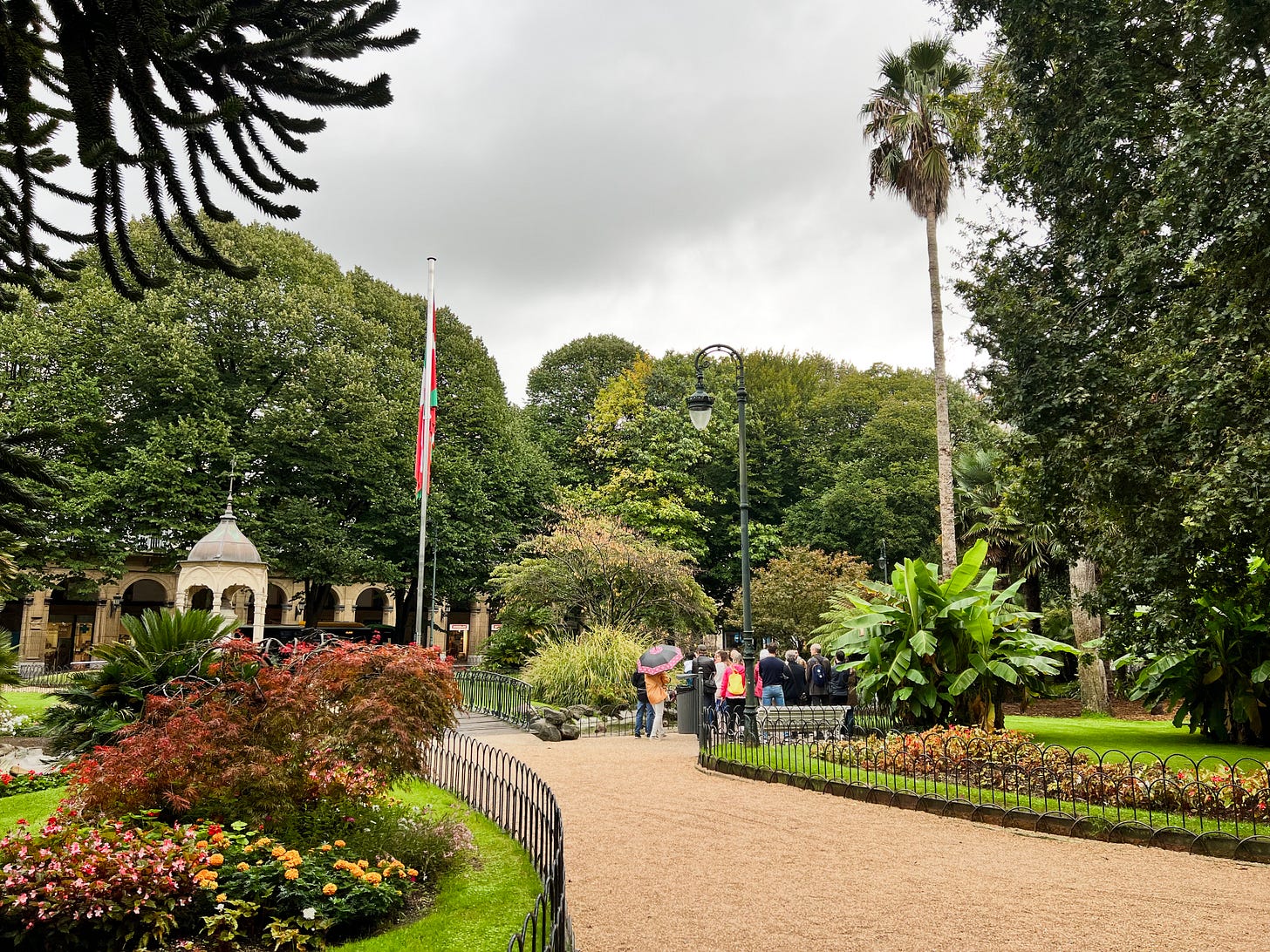
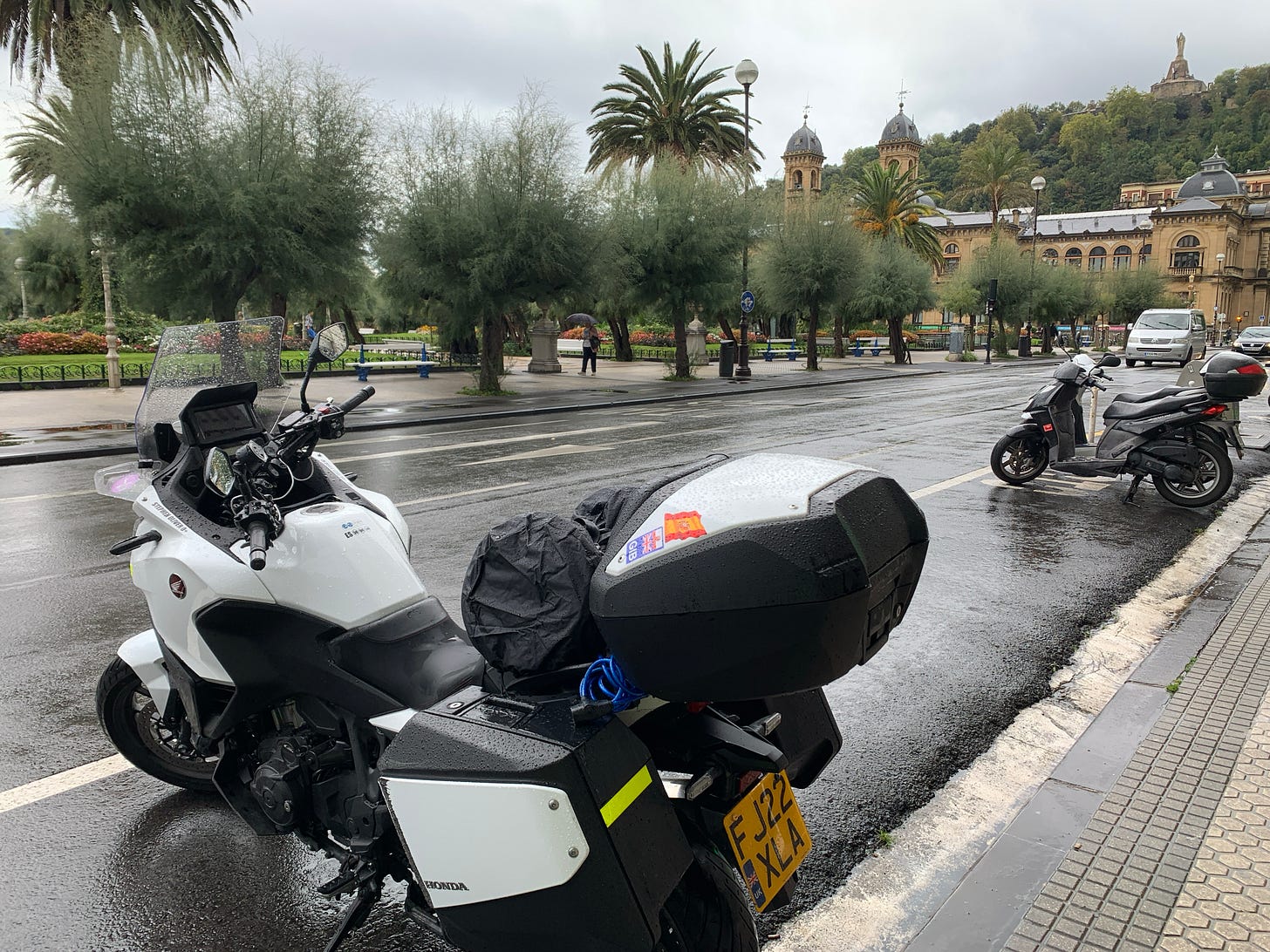
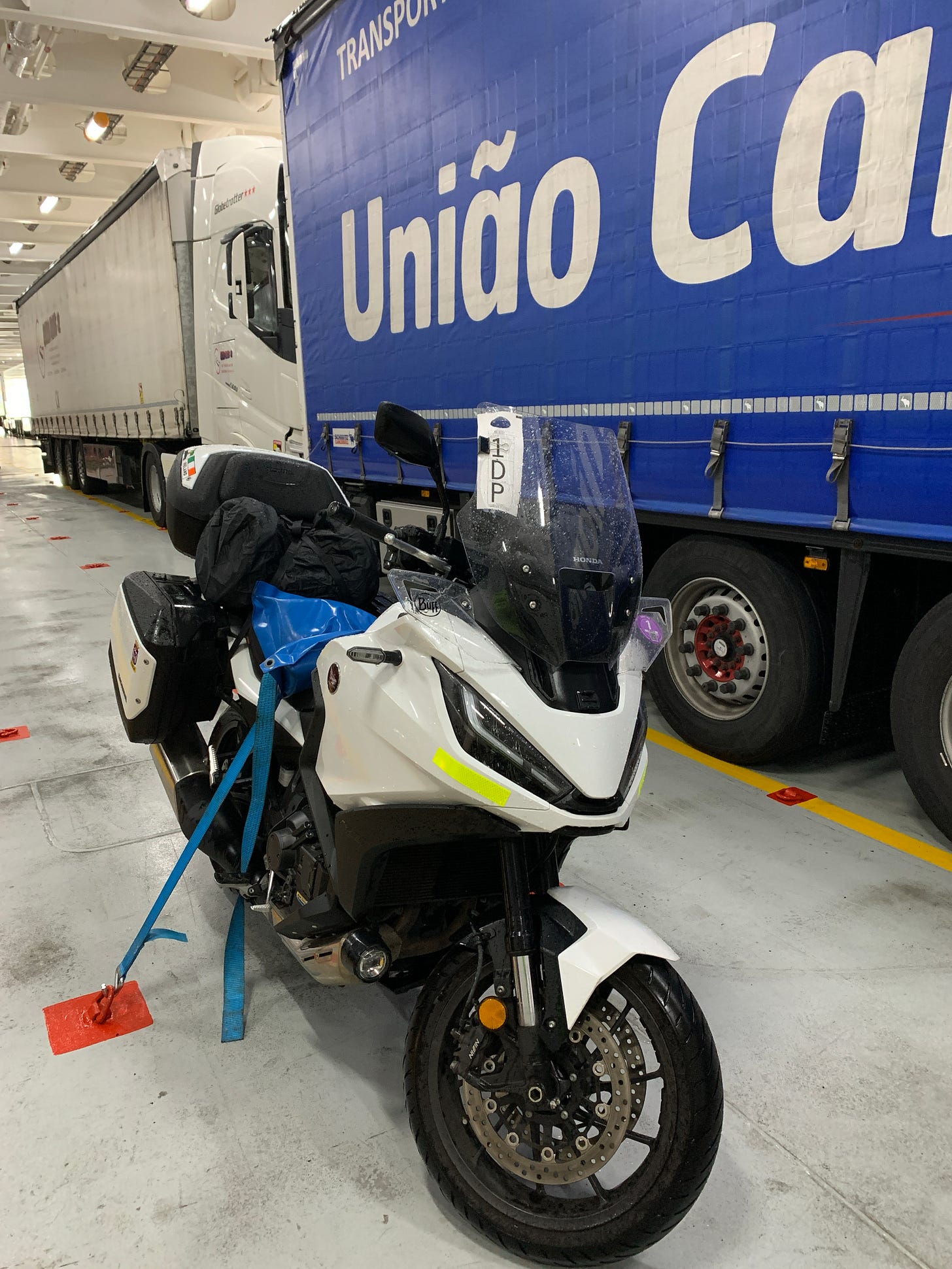
Excellent read Stephen-Such an apt and verbal assault on the weather I felt as if I should don waterproofs!